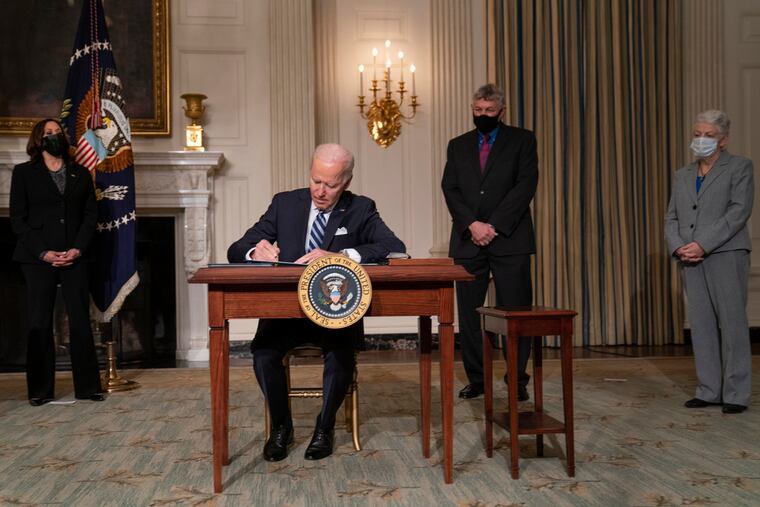Biden’s executive order on oil and gas drilling does little to protect health in Pa. | Opinion
Six reasons why Pennsylvanians shouldn’t wait on executive orders to stop fracking immediately.

Last week, President Joe Biden unveiled a list of executive orders aimed at combating the climate crisis, including a pause on all new lease permits for oil and gas development on federal land and water. Since almost all oil and gas drilling and fracking in Pennsylvania occurs on nonfederal land, the president’s order will not do much to prevent the damage that Pennsylvanians endure directly from this industry — harm highlighted in last summer’s scathing statewide grand jury report.
There are six reasons based on objective scientific evidence for why Pennsylvanians shouldn’t wait on executive orders to stop fracking immediately.
1. Industry rules and government regulations can’t make fracking safe. Fracking has never been shown to operate safely anywhere, including in Pennsylvania, where a multitude of peer-reviewed studies contained in the 7th edition of the “Fracking Science Compendium,” published last month by Concerned Health Professionals of New York and Physicians for Social Responsibility, show “grave health, environmental justice, and climate impacts.”
» READ MORE: Biden: ‘We can’t wait any longer’ to address climate crisis
Fine particle pollution, fumes and vapors, and releases of radioactive materials into the environment can’t be avoided. Leaks of methane occurring at every point of fracked gas infrastructure can’t be eliminated. And you can’t control earthquakes when massive rock formations under our feet are disturbed by horizontal drilling and hydraulic fracturing.
2. Fracking makes Pennsylvanians sick. Research in Pennsylvania now links fracking to several cradle-to-grave health conditions, including impaired infant development and health, asthma, heart problems, skin rashes, mental health problems, and possibly cancer. Between 2008 and 2018, a spike of rare childhood cancers, including Ewing sarcoma, was observed in four heavily fracked counties in southwestern Pennsylvania. Parents and physicians are very concerned that pollution and toxic, radioactive waste from fracking may be to blame for this outbreak.
3. Fracking scars the landscape, degrades the environment, and threatens our air, water, and soil. Article 1 Section 27 of the Pennsylvania Constitution grants citizens “the right to clean air, pure water, and to the preservation of the natural, scenic, historic, and esthetic values of the environment,” not just for all of us here today, but “for generations yet to come.” Air pollution comes off every point of fracking infrastructure — diesel trucks, well pads, pipelines, compressor stations, processing facilities, LNG terminals, petrochemical factories, and power plants. Contamination of private drinking water sources are well-documented in our state. Last year after a two-year investigation, a grand jury charged two fracking companies with illegally polluting surface and groundwater in Pennsylvania, making water unsafe to drink and threatening public health.
4. Fracking has an unsolvable toxic and radioactive waste problem. Solid waste and wastewater that flows back after a well is drilled and fracked are contaminated with toxic fracking chemicals, salty brine, heavy metals, and radioactivity. Dumping the solid waste in landfills and injecting the wastewater in deep-underground injection wells contaminates streams and aquifers, and triggers earthquakes. Water treatment technology cannot decontaminate frack wastewater and make it drinkable.
» READ MORE: Philadelphia appoints climate officer, sets more aggressive carbon reduction goal
5. Fracking is financially unsustainable. The COVID-19 pandemic, concerns about climate change, plummeting prices for renewable energy solutions, and negative public opinion about fracking (including 52% of Pennsylvanians who opposed it in one poll) have all driven down demand for oil and gas and investment in a fracking industry that has never been profitable. An analysis by Deloitte last year exploring this “great compression” showed that the fracking industry lost $300 billion over the preceding 15 years, and suffered more than 190 bankruptcies since 2010.
6. Fracking accelerates climate change. Fracked gas does not reduce the risk of climate change compared to coal. Huge quantities of methane leak from infrastructure and are intentionally vented into the atmosphere during fracking operations. Methane is 86 times more potent a greenhouse gas than carbon dioxide over a 20-year time frame. Research has found fugitive methane emissions from oil and gas sites to be at least 60% higher than EPA estimates, placing the goals of the Paris Climate Agreement further out of reach.
Trying to have it both ways — allowing fracking to continue while attempting to solve climate change — denies the scope, severity, and urgency of the crisis. Rather than wait on slow federal actions, Pennsylvania must leave fracking behind by ending it immediately and moving on to a cleaner, healthier, sustainable future.
Edward C. Ketyer is a pediatrician and president-elect of Physicians for Social Responsibility Pennsylvania. ecketyer@gmail.com